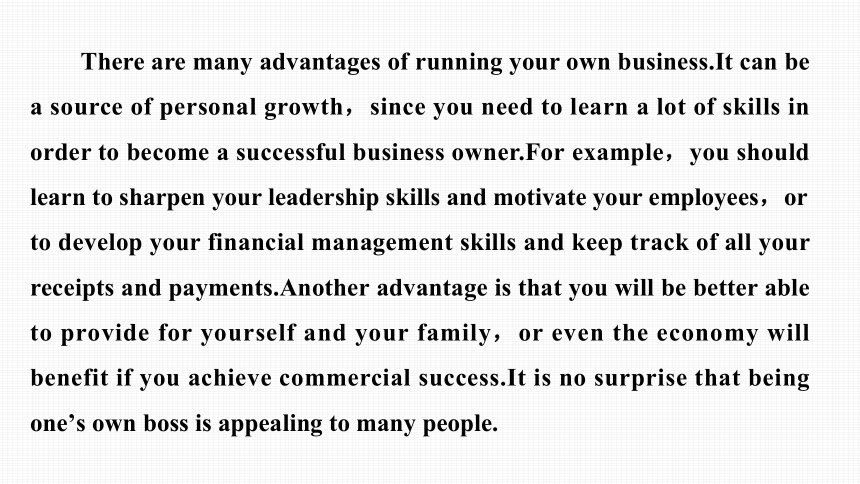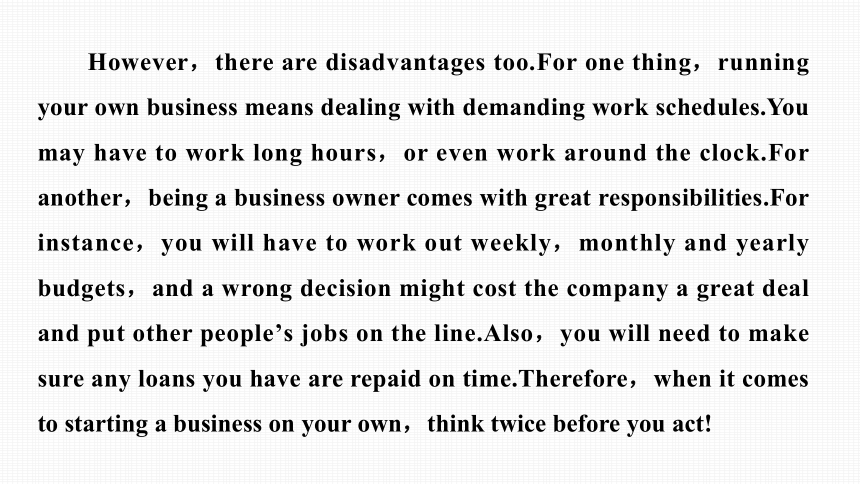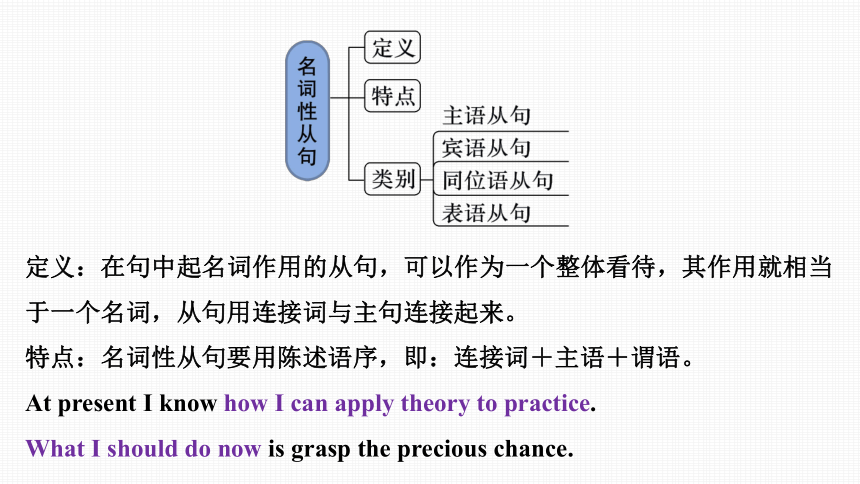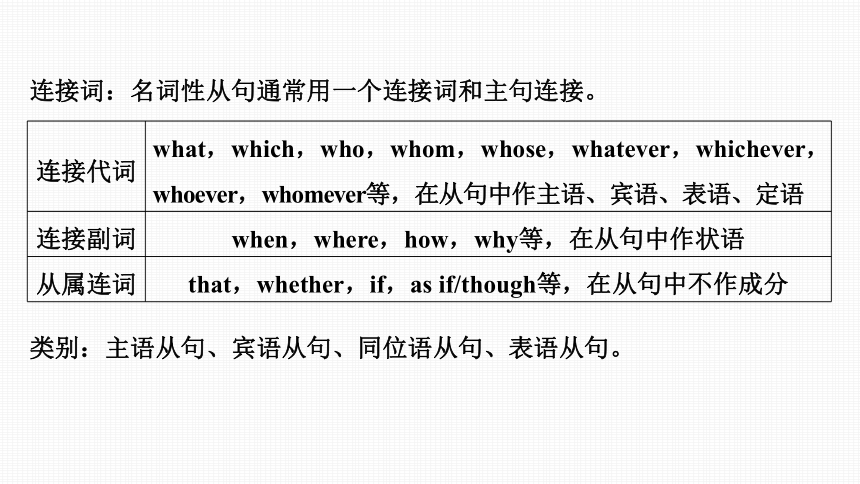人教版(2019)选修二Unit 2 Bridging Cultures Discovering Useful Structures—Review of noun clauses课件(共27张PPT)
文档属性
| 名称 | 人教版(2019)选修二Unit 2 Bridging Cultures Discovering Useful Structures—Review of noun clauses课件(共27张PPT) |  | |
| 格式 | pptx | ||
| 文件大小 | 676.5KB | ||
| 资源类型 | 教案 | ||
| 版本资源 | 人教版(2019) | ||
| 科目 | 英语 | ||
| 更新时间 | 2024-04-05 21:20:38 | ||
图片预览









文档简介
(共27张PPT)
Discovering Useful Structures—Review of noun clauses
Unit 2
Bridging cultures
语境 感悟
阅读以下短文,找出含有名词性从句的句子。
As you start to make plans for what you want to do with your future,you might ask a question whether you should start your own business.You may have a brilliant idea,but before you decide to put it into action,it is wise to weigh up the advantages and disadvantages of this option.
There are many advantages of running your own business.It can be a source of personal growth,since you need to learn a lot of skills in order to become a successful business owner.For example,you should learn to sharpen your leadership skills and motivate your employees,or to develop your financial management skills and keep track of all your receipts and payments.Another advantage is that you will be better able to provide for yourself and your family,or even the economy will benefit if you achieve commercial success.It is no surprise that being one’s own boss is appealing to many people.
However,there are disadvantages too.For one thing,running your own business means dealing with demanding work schedules.You may have to work long hours,or even work around the clock.For another,being a business owner comes with great responsibilities.For instance,you will have to work out weekly,monthly and yearly budgets,and a wrong decision might cost the company a great deal and put other people’s jobs on the line.Also,you will need to make sure any loans you have are repaid on time.Therefore,when it comes to starting a business on your own,think twice before you act!
答案 1.主语从句:It is no surprise that being one’s own boss is appealing to many people.
2.宾语从句:As you start to make plans for what you want to do with your future,...
Also,you will need to make sure any loans you have are repaid on time.
3.表语从句:Another advantage is that you will be better able to provide for yourself and your family...
4.同位语从句:... ,you might ask a question whether you should start your own business.
返 回
语法 精讲
定义:在句中起名词作用的从句,可以作为一个整体看待,其作用就相当于一个名词,从句用连接词与主句连接起来。
特点:名词性从句要用陈述语序,即:连接词+主语+谓语。
At present I know how I can apply theory to practice.
What I should do now is grasp the precious chance.
连接词:名词性从句通常用一个连接词和主句连接。
连接代词 what,which,who,whom,whose,whatever,whichever,whoever,whomever等,在从句中作主语、宾语、表语、定语
连接副词 when,where,how,why等,在从句中作状语
从属连词 that,whether,if,as if/though等,在从句中不作成分
类别:主语从句、宾语从句、同位语从句、表语从句。
一、主语从句(在复合句中作主语)
1.that,whether引导的主语从句
That they should get well prepared for their future is obvious to the students.
=It is obvious to the students that they should get well prepared for their future.
显而易见,学生们应该为自己的未来做好准备。
Whether he will succeed remains to be seen.
=It remains to be seen whether/if he will succeed.
他是否会成功还有待观察。
小结 that引导主语从句不可省略;主语从句位于主句谓语动作前,表示“是否”,只能用whether。若用it作形式主语,则whether与if可互换。
2.以连接代词和连接副词引导的主语从句常保留各自的疑问词义
Why the fire broke out is still unknown.
=It is still unknown why the fire broke out.
人们仍然不知道这场火灾为何会发生。
How he can learn to appreciate Chinese culture remains an important goal for him.
如何学会欣赏中国文化对他来说仍然是一个重要目标。
During this period,whatever people experience is fresh and exciting.
在这期间,人们所经历的任何东西都是新的、令人兴奋的。
What we can’t get seems better than what we have.
我们得不到的东西似乎比我们拥有的要好。
小结:如果主语从句过长,可以用it作形式主语。
3.it作形式主语还常有下列句型:
It is+名词(a fact,a pity,a question,no wonder... )+that从句
It is+形容词(necessary,strange,important,possible... )+that从句
It is+过去分词(said,reported,decided,believed,suggested,ordered... )+that从句
It+动词(短语)(seem,happen,turn out,occur to... )+that从句
It is a pity that she has made such a silly mistake.
她犯了这样一个愚蠢的错误,真是遗憾。
It is very important that a student (should) learn English well.
学生学好英语很重要。
It is suggested that the meeting (should) be put off.
有人建议会议延期召开。
It seems that he is not quite himself today.
他今天好像不怎么舒服。
二、宾语从句(在复合句中作及物动词或介词的宾语)
1.作及物动词或介词的宾语
His tutor explained (that) he should read more books.
他的导师解释道他应该多读书。
I will do what/whatever I can (do) to help him.
我会尽我所能去帮助他。
I wonder whether/if they will come to our party.
我想知道他们是否会来参加我们的晚会。
She asked me whose handwriting was the best in the class.
她问我谁的书法是班上最好的。
A modern city has been set up in what was once a wasteland.
一座现代城市已经在曾是废墟的地方建起来了。
It depends on how we solve the problem.
这取决于我们如何解决这个问题。
2.it作形式宾语
(1)find,consider,think,feel,believe,make+it+adj./n.+宾语从句
(2)enjoy,love,like,hate,appreciate,see to,insist on,depend on,rely on+it+宾语从句
I have made it clear that I will not accept this job.
我已经表明我不会接受这份工作。
I hate it when people ask me for money.我不喜欢别人向我要钱。
You can rely on it that he will turn up on time.你可以相信他会准时出现的。
3.观察下列例句,总结宾语从句的特殊用法
(1)He told me (that) he had two sons and that they had both gone to college.
他告诉我他有两个儿子,他们都去上大学了。
(2)I’m thinking of whether we should go to see the film.
我正在考虑我们是否应该去看电影。
I can’t say whether or not they can come tomorrow.
我不敢说他们明天是否能来。
She didn’t know whether to go or to stay.
她不知道是走还是留下。
总结 (1)当and 连接两个或者两个以上that引导的宾语从句时,只有第一个宾语从句可省略that,后面的宾语从句中的that不能省略。
(2)作介词宾语、与or not或不定式连用时,只用whether不用if。
三、同位语从句
在复合句中用作同位语的从句称为同位语从句。它一般放在fact,news,idea,truth,hope,problem,information,belief,thought,doubt,promise,question等抽象名词的后面,对前面的名词作进一步的解释,或说明前面名词的具体含义。同位语从句通常由that引导,也可由whether引导,或由连接代词(what,which,who,whose等)和连接副词(when,where,why,how等)引导。
The news that they had won the game soon spread over the whole school.
他们比赛获胜的消息很快传遍了整个学校。
He hasn’t made the decision whether he will go there.
他还没有作出决定是否去那里。
I have no idea where he lives.
我不知道他住在哪里。
The question who should do the job requires consideration.
谁应该做这项工作的问题需要考虑。
同位语从句和定语从句的区别:
(1)从意义上看,同位语从句是对一个名词的具体内容加以解释说明;定语从句是对名词进行修饰限定。
(2)从结构上看,that引导同位语从句时,不作成分;that引导定语从句时作成分。
比较:He told me the news that our team won.(同位语从句)
He told me the news that was exciting.(定语从句)
四、表语从句(在复合句中作表语,位于系动词之后)(具体用法讲解见Unit 1)
The trouble is that I have lost his address.
麻烦是我把他的地址弄丢了。
I was very angry.That was because he didn’t come.
我很生气,那是因为他没来。(强调原因)
He didn’t come.That was why I was very angry.
他没来,那就是为什么我很生气。(强调结果)
The reason why I was very angry was that he didn’t come.
我很生气的原因是他没来。
The question is whether he can make it.
问题是他能否成功。
返 回
达标检测
1. happened in my restaurant today was unbelievable.This afternoon a poorly dressed gentleman came into my restaurant.Nobody knew 2. he was.3. surprised us was 4. he finished two orders of food in a very limited time.We wondered 5. he was so hungry.There was some doubt 6. the man was able to pay the bill.The gentleman asked 7. we would mind waiting for just a few minutes.Then we were shocked to see 8. he took out of an envelope—a million pound bank note.I heard the news 9. two of this amount had been issued by the Bank of England.Hence,10. the gentleman showed us couldn’t be a fake.
给下列短文中的名词性从句填上适当的引导词
What
who
What
that
why
whether
if/whether
that
that
what
11. a gentleman with a million pound bank note was in rags and ate in our small restaurant was a big puzzle to all the people there.I really couldn’t describe 12. thrilled I was.
返 回
That
how
Discovering Useful Structures—Review of noun clauses
Unit 2
Bridging cultures
语境 感悟
阅读以下短文,找出含有名词性从句的句子。
As you start to make plans for what you want to do with your future,you might ask a question whether you should start your own business.You may have a brilliant idea,but before you decide to put it into action,it is wise to weigh up the advantages and disadvantages of this option.
There are many advantages of running your own business.It can be a source of personal growth,since you need to learn a lot of skills in order to become a successful business owner.For example,you should learn to sharpen your leadership skills and motivate your employees,or to develop your financial management skills and keep track of all your receipts and payments.Another advantage is that you will be better able to provide for yourself and your family,or even the economy will benefit if you achieve commercial success.It is no surprise that being one’s own boss is appealing to many people.
However,there are disadvantages too.For one thing,running your own business means dealing with demanding work schedules.You may have to work long hours,or even work around the clock.For another,being a business owner comes with great responsibilities.For instance,you will have to work out weekly,monthly and yearly budgets,and a wrong decision might cost the company a great deal and put other people’s jobs on the line.Also,you will need to make sure any loans you have are repaid on time.Therefore,when it comes to starting a business on your own,think twice before you act!
答案 1.主语从句:It is no surprise that being one’s own boss is appealing to many people.
2.宾语从句:As you start to make plans for what you want to do with your future,...
Also,you will need to make sure any loans you have are repaid on time.
3.表语从句:Another advantage is that you will be better able to provide for yourself and your family...
4.同位语从句:... ,you might ask a question whether you should start your own business.
返 回
语法 精讲
定义:在句中起名词作用的从句,可以作为一个整体看待,其作用就相当于一个名词,从句用连接词与主句连接起来。
特点:名词性从句要用陈述语序,即:连接词+主语+谓语。
At present I know how I can apply theory to practice.
What I should do now is grasp the precious chance.
连接词:名词性从句通常用一个连接词和主句连接。
连接代词 what,which,who,whom,whose,whatever,whichever,whoever,whomever等,在从句中作主语、宾语、表语、定语
连接副词 when,where,how,why等,在从句中作状语
从属连词 that,whether,if,as if/though等,在从句中不作成分
类别:主语从句、宾语从句、同位语从句、表语从句。
一、主语从句(在复合句中作主语)
1.that,whether引导的主语从句
That they should get well prepared for their future is obvious to the students.
=It is obvious to the students that they should get well prepared for their future.
显而易见,学生们应该为自己的未来做好准备。
Whether he will succeed remains to be seen.
=It remains to be seen whether/if he will succeed.
他是否会成功还有待观察。
小结 that引导主语从句不可省略;主语从句位于主句谓语动作前,表示“是否”,只能用whether。若用it作形式主语,则whether与if可互换。
2.以连接代词和连接副词引导的主语从句常保留各自的疑问词义
Why the fire broke out is still unknown.
=It is still unknown why the fire broke out.
人们仍然不知道这场火灾为何会发生。
How he can learn to appreciate Chinese culture remains an important goal for him.
如何学会欣赏中国文化对他来说仍然是一个重要目标。
During this period,whatever people experience is fresh and exciting.
在这期间,人们所经历的任何东西都是新的、令人兴奋的。
What we can’t get seems better than what we have.
我们得不到的东西似乎比我们拥有的要好。
小结:如果主语从句过长,可以用it作形式主语。
3.it作形式主语还常有下列句型:
It is+名词(a fact,a pity,a question,no wonder... )+that从句
It is+形容词(necessary,strange,important,possible... )+that从句
It is+过去分词(said,reported,decided,believed,suggested,ordered... )+that从句
It+动词(短语)(seem,happen,turn out,occur to... )+that从句
It is a pity that she has made such a silly mistake.
她犯了这样一个愚蠢的错误,真是遗憾。
It is very important that a student (should) learn English well.
学生学好英语很重要。
It is suggested that the meeting (should) be put off.
有人建议会议延期召开。
It seems that he is not quite himself today.
他今天好像不怎么舒服。
二、宾语从句(在复合句中作及物动词或介词的宾语)
1.作及物动词或介词的宾语
His tutor explained (that) he should read more books.
他的导师解释道他应该多读书。
I will do what/whatever I can (do) to help him.
我会尽我所能去帮助他。
I wonder whether/if they will come to our party.
我想知道他们是否会来参加我们的晚会。
She asked me whose handwriting was the best in the class.
她问我谁的书法是班上最好的。
A modern city has been set up in what was once a wasteland.
一座现代城市已经在曾是废墟的地方建起来了。
It depends on how we solve the problem.
这取决于我们如何解决这个问题。
2.it作形式宾语
(1)find,consider,think,feel,believe,make+it+adj./n.+宾语从句
(2)enjoy,love,like,hate,appreciate,see to,insist on,depend on,rely on+it+宾语从句
I have made it clear that I will not accept this job.
我已经表明我不会接受这份工作。
I hate it when people ask me for money.我不喜欢别人向我要钱。
You can rely on it that he will turn up on time.你可以相信他会准时出现的。
3.观察下列例句,总结宾语从句的特殊用法
(1)He told me (that) he had two sons and that they had both gone to college.
他告诉我他有两个儿子,他们都去上大学了。
(2)I’m thinking of whether we should go to see the film.
我正在考虑我们是否应该去看电影。
I can’t say whether or not they can come tomorrow.
我不敢说他们明天是否能来。
She didn’t know whether to go or to stay.
她不知道是走还是留下。
总结 (1)当and 连接两个或者两个以上that引导的宾语从句时,只有第一个宾语从句可省略that,后面的宾语从句中的that不能省略。
(2)作介词宾语、与or not或不定式连用时,只用whether不用if。
三、同位语从句
在复合句中用作同位语的从句称为同位语从句。它一般放在fact,news,idea,truth,hope,problem,information,belief,thought,doubt,promise,question等抽象名词的后面,对前面的名词作进一步的解释,或说明前面名词的具体含义。同位语从句通常由that引导,也可由whether引导,或由连接代词(what,which,who,whose等)和连接副词(when,where,why,how等)引导。
The news that they had won the game soon spread over the whole school.
他们比赛获胜的消息很快传遍了整个学校。
He hasn’t made the decision whether he will go there.
他还没有作出决定是否去那里。
I have no idea where he lives.
我不知道他住在哪里。
The question who should do the job requires consideration.
谁应该做这项工作的问题需要考虑。
同位语从句和定语从句的区别:
(1)从意义上看,同位语从句是对一个名词的具体内容加以解释说明;定语从句是对名词进行修饰限定。
(2)从结构上看,that引导同位语从句时,不作成分;that引导定语从句时作成分。
比较:He told me the news that our team won.(同位语从句)
He told me the news that was exciting.(定语从句)
四、表语从句(在复合句中作表语,位于系动词之后)(具体用法讲解见Unit 1)
The trouble is that I have lost his address.
麻烦是我把他的地址弄丢了。
I was very angry.That was because he didn’t come.
我很生气,那是因为他没来。(强调原因)
He didn’t come.That was why I was very angry.
他没来,那就是为什么我很生气。(强调结果)
The reason why I was very angry was that he didn’t come.
我很生气的原因是他没来。
The question is whether he can make it.
问题是他能否成功。
返 回
达标检测
1. happened in my restaurant today was unbelievable.This afternoon a poorly dressed gentleman came into my restaurant.Nobody knew 2. he was.3. surprised us was 4. he finished two orders of food in a very limited time.We wondered 5. he was so hungry.There was some doubt 6. the man was able to pay the bill.The gentleman asked 7. we would mind waiting for just a few minutes.Then we were shocked to see 8. he took out of an envelope—a million pound bank note.I heard the news 9. two of this amount had been issued by the Bank of England.Hence,10. the gentleman showed us couldn’t be a fake.
给下列短文中的名词性从句填上适当的引导词
What
who
What
that
why
whether
if/whether
that
that
what
11. a gentleman with a million pound bank note was in rags and ate in our small restaurant was a big puzzle to all the people there.I really couldn’t describe 12. thrilled I was.
返 回
That
how
